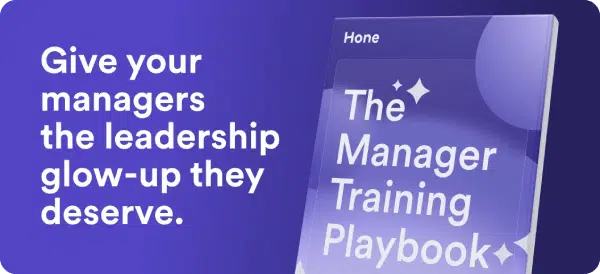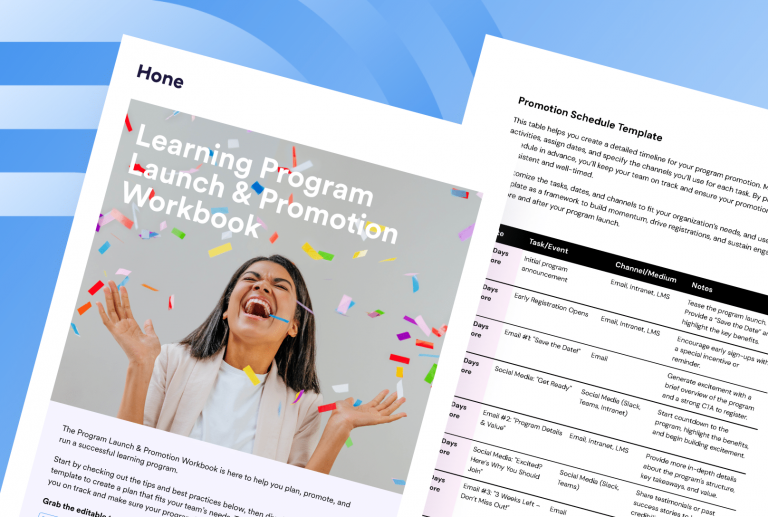What are Performance Reviews?
The definition of performance reviews, also known as a performance appraisal, is a process in which an employee’s work performance and progress toward achieving goals are evaluated and discussed. A performance review’s purpose is to provide employee feedback on their performance, identify strengths and weaknesses, and establish goals and objectives for the upcoming period.
During performance reviews, the employee and their manager typically meet to discuss the employee’s job responsibilities, accomplishments, and challenges. The review may include a discussion of the employee’s performance over a specific period, such as the past year, and may involve an evaluation of the employee’s job performance against specific performance standards or goals. Leaders must acknowledge the critical importance of performance reviews and follow-up. Performance reviews are a chance to assess and record development. And follow-ups provide accountability.
The performance review process may include several steps, such as:
- Setting objectives: Establishing clear objectives and performance standards for the upcoming review period.
- Collecting data: Gathering information about the employee’s performance from various sources, such as coworkers, customers, and other stakeholders.
- Conducting the review: Meeting with the employee to discuss their performance and progress toward achieving their objectives.
- Providing feedback: Providing feedback on the employee’s strengths and weaknesses and identifying areas for improvement.
- Establishing goals: Setting specific goals and objectives for the upcoming review period.
- Developing an action plan: Develop an action plan that outlines the steps employees can take to improve their performance.
Well-conducted performance reviews can help employees understand how their work contributes to the organization’s goals and can help them identify areas for improvement. It also provides a forum for communication between employees and their managers, leading to increased employee engagement, motivation, and job satisfaction. An organization or manager may evaluate an employee’s quality of work annually, biannually, quarterly, monthly, or weekly.
What are the Goals for Performance Reviews?
Work performance is the value of employees’ contributions to the organization. And supervisors need to assess that value in some way. Performance reviews can help companies evaluate how well employees perform their job duties. They’re also a chance to show employees areas where they can improve to align with companies’ overall mission.
When managers know how to conduct employee evaluations during performance reviews correctly:
- They give employees valuable feedback to help them improve professionally.
- Second, they motivate employees to do their best work.
- Third, they let managers and employees set productivity expectations.
- Fourth, they are a channel for workplace breakthroughs and ideas.
- Finally, they refocus work efforts and increase employee engagement.
Performance review meetings also make time for conversations. They are opportunities for managers to learn about the team. And workers can share details about their experiences.
What to Cover in Performance Reviews at Work?
Performance reviews can be awkward and stressful if neither the manager nor the employee prepares. Studies show that more frequent performance reviews reduce anxiety. People are less likely to be nervous if they know what to expect. These meetings must be strategic rather than informal catch-ups. Here are some things to cover in performance review meetings.
Recognize Employee’s Accomplishments & Strengths
Managers can ease into the conversation with some light chitchat followed by acknowledging the employee’s accomplishments. Employees want to know that their manager sees their value and appreciates their triumphs.
Likewise, dialogue can transition to their strengths and positive work habits. Employee strengths and habits improve their work or overall impact on company culture.
Review Daily Responsibilities and Performance Measurements
It may seem redundant to list day-to-day tasks, particularly with employees who have been with the company for a while. However, tasks can fall by the wayside, and managers may need to know what an employee does.
Employees focus on performance metrics. So, workers are not incentivized to pursue these behaviors if the organization doesn’t measure the best ones.
1. Address Weaknesses & Areas for Improvement
Performance reviews are critical to the ongoing dialogue between managers and employees. They are platforms to clarify areas where the employee can improve. In addition, managers and direct reports can discuss reasons for performance weaknesses.
For instance, employees may need help with avoidable hurdles, like poor instructions. But conversely, workers and supervisors may realize that expectations should be lowered.
2. Evaluate & Set Goals
Like clarifying metrics, goals are part of well-defined performance criteria. Managers must set ambitions and clear goals that align with the organization’s overall mission. These objectives are productivity expectations to measure the employee’s success.
The specific goals depend on the performance review period, such as annually or weekly. Weekly goals may include meeting short project deadlines. Year-end plans could detail overall performance, such as team contributions or embodying company values.
What are Phrases to Use in Performance Reviews?
Managers must provide feedback during performance reviews. But most people prefer to avoid receiving criticism or critical feedback. Likewise, managers don’t want to be bearers of bad news.
Additionally, managers may be guilty of monologuing, sending mixed messages, and giving vague statements. But they can avoid these issues if they take a structured and balanced assessment approach.
Preparation is the key to successful performance reviews. Managers must know how to manage difficult conversations remotely and in person. The following are good examples of phrases to use during each part of an individual’s performance review.
The Beginning: Checking In
- How are you feeling today?
- Is this still an excellent time to have our debrief?
- Here’s how I’d like to structure the meeting today…
Summarize Strengths and Wins
- Based on your observations, what were your top strengths this year?
- Here’s what I think you’ve been doing well…
- The company values you live up to most are…
Managers should also indicate the impact of the employee’s strengths:
- For example, I noticed you would go out of your way to coach struggling team members. Devon said that your coaching helped them uplevel their work. That made the product launch go smoothly.
Summarize Areas for Improvement
- Based on the feedback you received this year, what do you think you could have done differently to be more effective?
- What are the growth areas most vital for you to continue succeeding in your role?
- Here are a few areas I’d like you to focus on improving in the next evaluation period…
Like with strengths, managers should mention the impact of the employee’s area for improvement:
- I noticed you would often do work yourself without delegating to others. However, James said they felt you didn’t include them in the project. That ultimately led us to delay the product launch.
Present the Overall Rating, If Relevant
Overall, your performance during this period:
1 – did not meet expectations
2 – mostly met expectations
3 – met expectations
4 – exceeded expectations
Ask for Reactions
- How did this feedback land?
- What do you agree or disagree with?
- What did I miss?
- What emotions come up in response to the feedback? What do you feel most (enter emotions) about?
- Do you agree with my summary of the feedback from your teammates?
Discuss the Path Forward
- As we look toward next year, I want to ensure you feel empowered to do your best work. Therefore, I will send you a few questions to help us develop the right plan together. Then, in our next one-on-one, we’ll review your answers and address any questions you have after reflecting on your review.
5 Communication Phrases for Performance Reviews
The following are some excellent examples of describing communication and interpersonal skills:
- You have highly effective verbal and written communication skills.
- You engage and relate well with the team. You quickly build positive relationships.
- You are friendly and open-minded, so people feel comfortable working with you.
- You have a natural ability to put others at ease. You can connect with people even in an uncomfortable environment.
- You effectively communicate job requirements and expectations. In addition, you regularly speak with other team members to ensure that work is on track.
5 Initiative Phrases for Performance Reviews
Here are some excellent examples of describing personal initiative for an individual’s performance:
- You require minimal supervision. You show initiative on your own.
- You don’t wait for instructions. Instead, you show the initiative to find new tasks yourself.
- You are goal-oriented and set your priorities to accomplish your job.
- [Employee] supports new ideas, goals, and working methods no matter where they come from.
- You are flexible and can adjust to any situation. You are willing to do whatever is necessary to get the task done.
5 Teamwork Phrases for Performance Reviews
The following are some excellent examples of describing cooperation and teamwork skills:
- You focus on the team’s success. You are an excellent example of our company culture.
- Your enthusiasm for the work shines through and infects others.
- You create good relationships with your colleagues and staff.
- You share your expertise with others. You complete tasks without concern about who will take the credit.
- You show a high level of team spirit. You readily cooperate with your team members to get the job done.











